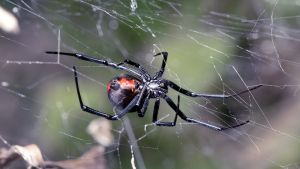Summer in Australia is filled with scorching days, barbecues with friends and hitting the beach. Besides this, summer is also the time of year when spiders seem to appear quite frequently in and around homes. Some spiders are harmless, however some are poisonous and can be lethal to you and especially to your pets. This blog will focus specifically on what to do if your dog gets bitten by a spider. This blog will also provide some preventative measures to avoid a swarm of spiders making a home out of your home. Let’s get into it.

WHAT TO LOOK OUT FOR?
It is important to familiarise yourself with the most common poisonous spiders so you are able to recognize and differentiate between spiders you come across. Some spider bites can just cause skin irritation however the following spider species can cause fatalities in dogs:
- Redback Spider
- Funnel-Web Spider
- White-Tail Spider
- Black Widow Spider
- Australian Tarantula Species
WHAT ARE THE SYMPTOMS?
In some cases you may not be present when your dog is bitten by a spider, therefore it is vital you know what symptoms a spider bite can cause in your dog.
These include:
- Sudden or unusual tiredness
- Skin irritation and swelling in a particular area
- Pain in the irritated area
- Vomiting and diarrhoea
- Restlessness
- Limping in one or both legs
- Breathing difficulties
- Unusual scratching
- Salivating
TREATMENT
If you have any suspicions that your dog has been bitten by a spider, the best act of first aid you can provide is seeking immediate veterinary attention. Your veterinarian will decide on treatment depending on the severity of your dog’s symptoms. This may be as simple as medication or as extreme as surgery to remove infected tissue.
Tip – If you are present when your dog is bitten by a spider, look around the area to see if you can locate the spider. This will help ensure your dog receives the most accurate treatment specific to the spider itself.
PREVENTATIVE MEASURES
Whilst it can be difficult keeping your furry friend out of danger 24/7, you can certainly carry out some things around your home to at least minimise the risk of spiders and therefore spider bites.
- Regularly wash pet bedding
- Regularly check your dogs bedding/ sleeping area for any signs of spiders (e.g. webs)
- Keep your home tidy and free from clutter (clutter makes the perfect hiding space for spiders and insects of all kinds)
- Do not leave food or crumbs out as this attracts insects and animals of all kinds
- Regularly clean your gutters
- Enlist the help of a pest management company to fumigate your home
So there you have it. We hope this blog has provided you with some peace of mind knowing there are certain preventive measures you can take to help avoid spider bites. However sometimes spider seem to appear even in the cleanest of areas. Stay alert, regularly monitor your dog and take note on any unusual behaviour. With summer fast approaching, this is important right now more than ever.











Leave A Comment